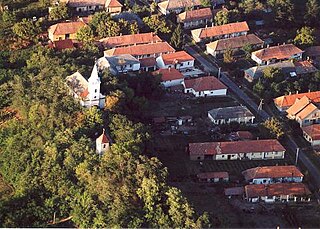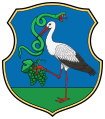
Central Europe is the central region of Europe. Central Europe includes contiguous territories that are sometimes also considered parts of Western Europe, Southern Europe and Eastern Europe. The concept of Central Europe is based on a common historical, social and cultural identity and is a patchwork of territories that are traditionally Catholic and Protestant. The Thirty Years' War between Catholicism and Protestantism was a significant shaping process in the history of Central Europe, and neither side was able to prevail in the region as a whole.

Hungary is a landlocked country in Central Europe. Spanning 93,030 square kilometres (35,920 sq mi) of the Carpathian Basin, it is bordered by Slovakia to the north, Ukraine to the northeast, Romania to the east and southeast, Serbia to the south, Croatia and Slovenia to the southwest, and Austria to the west. Hungary has a population of 10 million, mostly ethnic Hungarians and a significant Romani minority. Hungarian, the official language, is the world's most widely spoken Uralic language, and among the few non-Indo-European languages widely spoken in Europe. Budapest is the country's capital and largest city; other major urban areas include Debrecen, Szeged, Miskolc, Pécs, and Győr.

Hungary wields considerable influence in Central and Eastern Europe and is a middle power in international affairs. The foreign policy of Hungary is based on four basic commitments: to Atlantic co-operation, to European integration, to international development and to international law. The Hungarian economy is fairly open and relies strongly on international trade.

Budapest is the capital and the most populous city of Hungary, and the ninth-largest city in the European Union by population within city limits. The city has an estimated population of 1,752,286 over a land area of about 525 square kilometres. Budapest is both a city and county, and forms the centre of the Budapest metropolitan area, which has an area of 7,626 square kilometres and a population of 3,303,786, comprising 33% of the population of Hungary.

Ferenc Puskás was a Hungarian football player and manager, widely regarded as one of the greatest players of all time and the sport's first international superstar. A forward, he scored 84 goals in 85 international matches for Hungary, played four international matches for Spain and scored 514 goals in 529 matches in the Hungarian and Spanish leagues. He became an Olympic champion in 1952 and led his nation to the final of the 1954 World Cup. He won three European Cups, 10 national championships and eight top individual scoring honors. In 1995, he was recognized as the greatest top division scorer of the 20th century by the IFFHS. With 729 goals in official games scored during his career, he is the fifth top goalscorer of all time.

Fidesz – Hungarian Civic Alliance is a right-wing populist and national-conservative political party in Hungary.

The Hungary national football team represents Hungary in men's international football and is controlled by the Hungarian Football Federation. The team has made nine appearances in the FIFA World Cup finals and four appearances in the European Championship, and plays its home matches at the Puskás Aréna, which opened in November 2019.

Viktor Mihály Orbán is a Hungarian politician who has been Prime Minister of Hungary since 2010; he was also Prime Minister from 1998 to 2002. He has also been President of Fidesz, a national conservative political party, since 1993, with a brief break between 2000 and 2003. He supervises communications, long-term planning, daily operations, policy direction, and selection of candidates.

Alsóregmec is a village in Borsod-Abaúj-Zemplén county, Hungary.

Arnót is a village in Borsod-Abaúj-Zemplén county, Hungary.

Bodrogolaszi is a village in Borsod-Abaúj-Zemplén county, Hungary.

Halmaj is a village in Borsod-Abaúj-Zemplén county, Hungary. Before World War II, there was a Jewish community in Halmaj. At its height, there were 61 Jews in the community most of them were murdered by the Nazis in the Holocaust.

Karos is a village in Borsod-Abaúj-Zemplén county, Hungary.

Tard is a village in Borsod-Abaúj-Zemplén county, Hungary.

Bódvaszilas is a village in Borsod-Abaúj-Zemplén county, Hungary.

Göncruszka is a village in Borsod-Abaúj-Zemplén county, Hungary.

Szirmabesenyő is a village in Borsod-Abaúj-Zemplén county, Hungary.

Ádám Csaba Szalai is a Hungarian professional footballer who plays for German club 1. FSV Mainz 05 and the Hungary national team as a forward.

Hidvégardó is a village in Borsod-Abaúj-Zemplén County in northeastern Hungary. It contains the northernmost point of Hungary.

In 2015, Hungary built a border barrier on its border with Serbia and Croatia. The fence was constructed during the European migrant crisis, with the aim to ensure border security by preventing illegal immigrants from entering, and enabling the option to enter through official checkpoints and claim asylum in Hungary in accordance with international and European law. The number of illegal entries to Hungary declined greatly after the barrier was finished as it effectively abolished the access to asylum in Hungary.
























